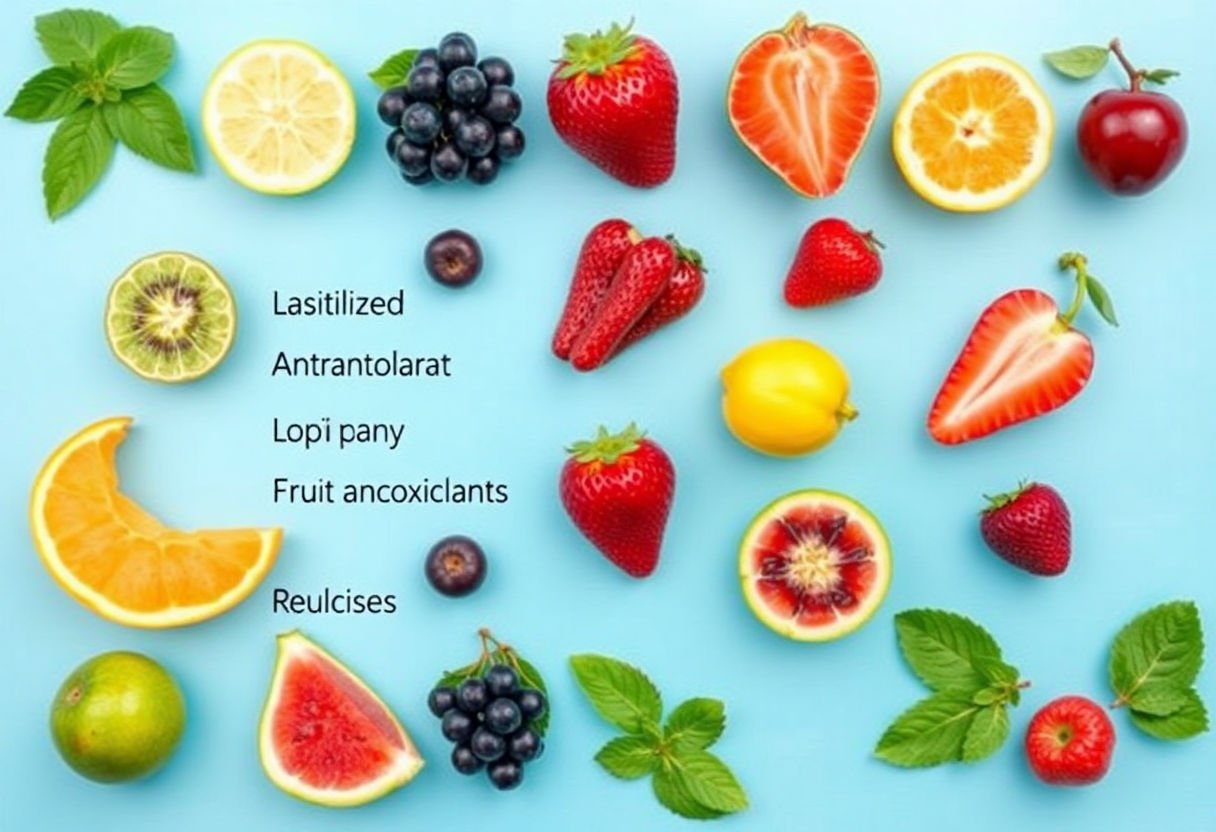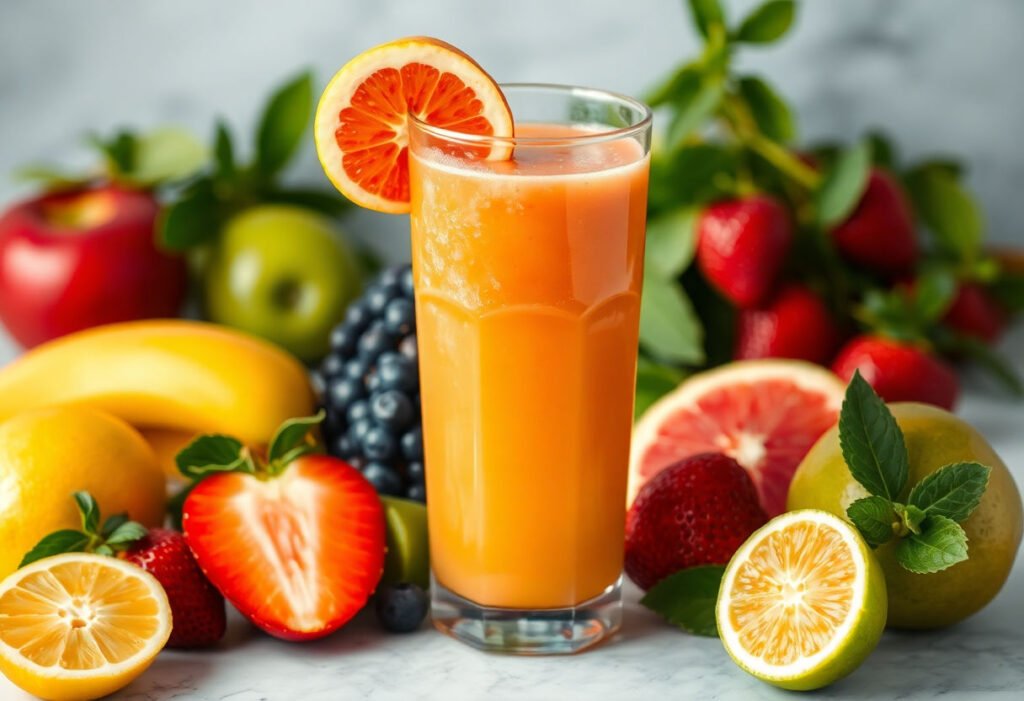Drink up for a healthier you. Anti-inflammatory fruit juices are gaining attention for their health benefits. These juices are full of antioxidants that help reduce inflammation. They can aid in fighting conditions like arthritis and heart disease. In this article, learn which fruits to use and how to make tasty juice blends. Find simple recipes like Berry Bliss and Citrus Refresher that you can make at home. Know the best times to enjoy these juices and be aware of potential side effects. Ready to boost your health with delicious and easy-to-make juices? Keep reading!
Key Takeaways
- Anti-inflammatory fruit juices offer antioxidants and nutrients that fight inflammation.
- Regular intake can help lessen inflammation-related health issues.
- Learn which fruits have the best anti-inflammatory properties and how to blend them.
- Easy recipes enable you to create delicious juices at home.
- Balance and moderation are key to maximizing benefits while avoiding potential side effects.
Understanding Inflammation and Its Impact on Health

Inflammation acts as the body’s first responder. When there is an injury or attack from germs, it rushes to heal and protect. This process is usually good. It helps heal wounds and fights infections. But when it hangs around too long it becomes a problem. This is known as chronic inflammation.
Chronic inflammation can harm the body. It can lead to serious health issues like arthritis, diabetes, and heart disease. Imagine a fire that keeps burning but never goes out. It begins to damage everything around it. That’s chronic inflammation in the body. It harms tissues and organs over time.
The good news? You can tame this fire with the right nutrients. Many fruits contain substances that help reduce inflammation. These fruits are packed with antioxidants and vitamins. They help fight off the tiny troublemakers that keep the fire burning.
By including these fruits in your diet, you can help lower the risk of chronic issues. Think of it as using the right tools to safely put out the fire before it gets out of control. Fruits like berries, cherries, and citrus can help. They are both delicious and beneficial for health.
By sipping anti-inflammatory juices, you can offer your body support. It is a small change with big benefits. Stay healthy and use nature’s helpers to fight inflammation.
The Role of Antioxidants in Fighting Inflammation

Antioxidants protect us from something called free radicals. Free radicals come from things like pollution, cigarette smoke, and even some foods. They can hurt our cells and lead to illnesses when they build up. Antioxidants act like tiny superheroes. They stop these free radicals from causing harm.
Fruits like berries, cherries, and oranges are rich in antioxidants. They contain vitamins like A, C, and E. These vitamins work together to keep our bodies healthy. They support the fight against inflammation too. By reducing free radicals, antioxidants help decrease swelling and pain.
Think of how a lemon refreshes on a hot day. Antioxidants offer this kind of relief to our bodies. They clear out the bad stuff and keep our system running smoothly. Including fruits with high antioxidant content in juices can be very helpful.
For example, blueberries are packed with antioxidants. They boost heart health. Strawberries are another great option. They contain vitamin C, which strengthens the immune system. Each fruit adds its own power to the juice.
Adding a mix of fruits to your juice can target inflammation in different ways. It makes every sip count. Be sure you pick fruits that are fresh and vibrant. This helps keep their nutritional value. Drinking these fruit juices may help support overall health while keeping bad things, like chronic inflammation, at bay.
Top Anti-Inflammatory Fruits and Their Benefits

Berries pack a punch in fighting inflammation. They are small but mighty. Strawberries, blueberries, and raspberries hold high amounts of antioxidants. These tiny fruits help the body with healing. They are like shields against harmful invaders. They taste sweet and work well in juices.
Cherries, especially tart ones, have strong anti-inflammatory powers. Athletes often consume them to support muscle recovery. Their rich red color is not just attractive. It means they have plenty of nutrients. Adding cherries to your juice can bring a tangy twist.
Citrus fruits, like oranges and grapefruits, offer vitamin C in abundance. They help lower inflammation and boost the immune system. Drinking a glass of orange juice in the morning can kickstart your day. It is refreshing and full of benefits.
Pineapples bring something extra to the table. They contain an enzyme called bromelain. This enzyme aids in reducing swelling and pain. Pineapple juice is not only tasty but also soothing for the body.
Grapes, especially the dark ones, are full of antioxidants. They help in protecting the heart and easing joint pain. Grapes can be eaten whole, or their juice enjoyed as a delightful drink.
Using these fruits wisely in your juices can make a difference. They are natural ways to lower inflammation. Enjoy their taste and their health benefits.
Creating the Perfect Anti-Inflammatory Fruit Juice Blend
Creating the perfect fruit juice blend involves understanding how different fruits work together. Start with the right ingredients. Choose fruits known for their anti-inflammatory properties. Berries, cherries, and citrus fruits make great choices. These fruits burst with antioxidants and vitamins.
Consider the balance of flavors. Some fruits add sweetness, while others give a tangy kick. Mixing sweet and sour fruits often creates a delicious taste. Think of a mixture of strawberries and lemons.
Texture matters too. Adding bananas or avocados can make a juice smooth and creamy. If you like your juice lighter, mix with water or ice. You can also use a blender instead of a juicer for a thicker texture.
Add extras for variety. Spices like ginger and turmeric pack an extra punch. They not only enhance flavor but also boost health benefits. A small piece of ginger can transform plain apple juice into something special.
Keep it simple at first. Try starting with two or three fruits. As you get more comfortable, experiment with new combinations. Remember that too many strong flavors can overwhelm, so add extras slowly.
In summary, the perfect anti-inflammatory juice blend combines the right fruits, balances flavors, considers texture, and occasionally adds spices. with these easy steps, you can sip your way to a healthier you.
Simple and Delicious Anti-Inflammatory Juice Recipes
Try these easy recipes to boost your health.
Berry Bliss
Mix this drink for a burst of flavor and health. You’ll need:
- 1 cup of strawberries
- 1 cup of blueberries
- 1 cup of cold water
Blend everything until smooth. Pour and enjoy the rich taste. Berries add antioxidants to your day. These help your body stay strong and healthy.
Citrus Refresher
Wake up your senses with this citrus drink. Here’s what you need:
- 2 oranges, peeled
- 1 lemon, peeled
- 1 cup of water
Juice the oranges and lemon. Stir in the water. This drink gives you a vitamin C boost. It’s like a sunny morning in a glass.
Green Lemonade
A twist on classic lemonade. It’s fresh and healthy.
Ingredients:
- 2 green apples
- 1 cucumber
- 1 lemon, peeled
Juice all ingredients, mixing well. Green apples add a sweet, tart flavor. Cucumber cools down the taste, making it refreshing.
Trying these recipes gives you a taste of health with a splash of fun. Each drink offers a mix of flavors and benefits. Adding them to your day can support your body and keep things interesting.
The Best Time to Consume Anti-Inflammatory Juices

Drinking anti-inflammatory juices can aid your health, but timing adds extra benefits. Drinking them at the right time can improve how well you feel. So, when should you drink these juices?
Before meals: Drinking anti-inflammatory juice before a meal can prepare your stomach. The juice helps start your digestive system. It may even help reduce inflammation before any food enters your body.
After exercise: After a workout, your body craves nutrients. A glass of anti-inflammatory juice can meet this need. It replenishes nutrients and helps soothe tired muscles. Picture it as a refreshing treat after a run or gym session.
In the morning: Starting your day with a juice could boost your energy. Think of it as an electric start to your day. It can help to wake you up and get you going.
Before bedtime: You might enjoy a calming juice at night. Juices with mild flavors like chamomile or turmeric can ease the mind. This habit can help you relax and sleep better.
Consider your lifestyle and find what works best. Some enjoy juice with breakfast. Others may drink it after a busy day. Whatever time you choose, make it part of your routine. Let the juice work for your body. Enjoy each sip and feel the benefits.
Potential Side Effects and Precautions

Drinking fruit juices can boost health, but moderation is key. Drinking a lot of juice might lead to some problems. Let’s take a closer look at a few points to keep in mind.
High Sugar Intake: Even though fruit juices hold many benefits, they contain natural sugars. When consumed in large amounts, these sugars can lead to weight gain. It’s wise to limit juice intake to a small glass a day. Remember, eating whole fruits provides fiber and helps manage sugar levels.
Possible Stomach Upset: Some fruits might bother sensitive stomachs. Citrus fruits like oranges or lemons can be acidic, causing heartburn for some people. If you’re new to fruit juices and feel discomfort, slowing down might help.
Allergic Reactions: Some people may have allergies to certain fruits. Signs like itching, swelling, or hives after a glass of juice signal an allergy. Avoiding the fruit causing trouble is the best solution.
Blood Sugar Concerns: If your blood sugar management is crucial, juice should be taken with caution. Even natural fruit sugars might spike the levels. Monitoring portions and pairing with a protein source can lower the risk.
For most, these juices offer great health benefits. But like any food, they come with their share of things to watch out for. Balancing your choices ensures you enjoy the tasty benefits without trouble.
Conclusion
Anti-inflammatory fruit juices offer a tasty way to improve health. They reduce inflammation with their antioxidant-rich properties. Regular consumption may help prevent issues like arthritis and heart disease. The key is balance. Enjoy these juices, but watch out for sugar content. Pairing them with a healthy lifestyle amplifies their benefits. Consider exploring new fruit combinations to keep it exciting. Embrace the journey towards better health, one sip at a time.
Frequently Asked Questions
What are the benefits of drinking anti-inflammatory fruit juices?
Anti-inflammatory fruit juices are packed with antioxidants and nutrients. These help reduce inflammation in the body, potentially lowering the risk of health issues like arthritis and heart disease.
How often should I drink these juices?
For best results, enjoy a serving of these fruit juices daily or a few times a week. They can complement a balanced diet and active lifestyle.
Can I use any fruits for these juices?
Not all fruits have anti-inflammatory benefits. Focus on berries, cherries, and citrus fruits. These are known for their high antioxidant content.
Are there any side effects to consider?
Some people may experience high sugar intake from fruit juices, so moderation is key. Those with specific health conditions should consult a doctor.
When is the best time to drink anti-inflammatory juices?
Drinking these juices before meals or after workouts may provide the most benefits. This can aid digestion and recovery.


